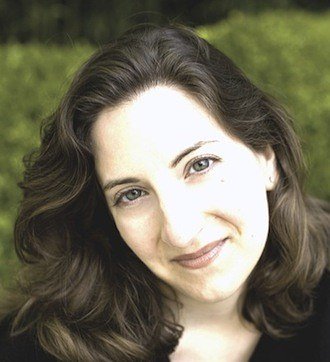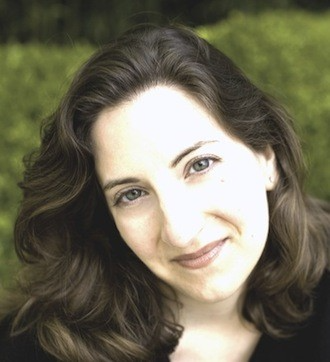Girl Talk with Elizabeth Bard

Sat 15 May 2010

A few months ago all I was hearing was Lunch in Paris, Lunch in Paris—it seemed everyone who was anyone was reading Lunch in Paris: A Love Story, with Recipes, by Elizabeth Bard. As usual I was a bit behind on my reading, but I launched into it finally (and appropriately) on my most recent trip to France, several weeks ago. True to the reviews, the book is a fast read, a charming window onto the author’s life in Paris, an interesting discussion of her two cultures (American and French) and an adorable love story with her now husband. Plus, there are some delightful recipes from Bard, who grew up in New Jersey. I enjoyed it thoroughly and recommend it to anyone who loves Paris, food or just a sweet love story. Happily Elizabeth agreed to answer some questions.
Your book, Lunch in Paris, released in February to excellent reviews, is your first. What gave you the inspiration to write it, and did you find it quite different from writing for newspapers, magazines and websites?
Almost as soon as I arrived in France, I knew I wanted to write about the roller coaster of international living and the richness of intercultural marriage. When I sat down to think about how I really discovered France, I found that the most significant moments happened “autrip de la table”—around the table. It seemed natural to structure the book around the markets, the meals and the ingredients that were my first keys to France.
I loved the variety of writing for newspapers and magazines. Sustaining a narrative over the course of a book was a steep learning curve—a mountain I loved climbing! My journalism experience has been invaluable, not least because I respond very well to being edited. A good editor always finds a way to help me make my work better, stronger, truer.
It seems everyone I meet now is reading your book. Could you tell us a bit about the story, for those readers out there who haven’t yet read it?
Lunch in Paris is really the story of two parallel love affairs, one with my future husband, the other with French cuisine. It’s a romance about the richness of intercultural marriage: how the American “Just do it” attitude and that French joie de vivre learn to coexist—and strengthen each other.
How did you become so passionate about cooking? What are your favorite recipes from the book?
Cooking has always been an important part of how I relate to other cultures. I’m that girl who reads the restaurant section of the guidebook before the museum section. I want to know where the best market is, what little hole-in-the-wall we should be searching out for lunch.
Choosing my favorite recipes from Lunch in Paris is difficult, because so many of them are a part of our everyday lives. I love the braised and slow-roasted dishes, like the daube or the honey pork ribs—they fill the house with the most amazing smells. I also adore the tagine recipes I learned from my husband’s godfather, who is from Algeria. The spices are so warm and welcoming. Definitely food for a party!
What area of Paris do you live in and what are your favorite haunts in your neighborhood?
We live by the Canal St.-Martin, in the 10th Arrondissement. It’s very laid back and, recently, quite trendy. It’s a great neighborhood to people-watch. Grab a coffee or a drink at any of the cafés along the canal . . .
What is the most difficult and the most rewarding thing about being married to a Frenchman (or someone from a different culture)?
My father used to say, “‘Assume’ makes an ‘a-s-s’ out of ‘u’ and ‘m-e.’” Being married to someone from another culture means that you can never assume what the other person is thinking. You have to take a step back and examine your feelings—“Am I pissed at him, or am I pissed at France?” It keeps us mindful, which I think is healthy for any relationship. I like to say that my husband and I will never be bored with each other—we just don’t understand each other well enough!
You are also an art historian. Have you quit your day job, or do you still keep abreast of the art world?
Museums are a part of my DNA, so I’ll always have a strong connection to those institutions. I’m sure I’ll continue to write about art, but the book has widened my journalism opportunities, giving me a chance to write some fun personal pieces. I just wrote about picnics for Marie Claire’s summer entertaining issue, and this past March I did an essay about emotional eating for Harper’s Bazaar.
What do you enjoy writing about most: food, art, culture or travel? Why?
My ideal piece of writing is a combo of all those things—maybe a city guide with my favorite museums, markets, restaurants and walks . . .
Describe your ideal day in Paris.
My ideal day is our typical lazy Saturday: get up on Saturday morning, pick up a croissant and sit down in the sun for a café crème. Go to the outdoor market, pick out some cheese, berries, salad—and get a roasted chicken with herbs from the rotisserie man (his always come out better than mine). By the time we wander home it’s time for lunch and maybe a walk down to the river for Berthillon ice cream.
What do you find most frustrating about living in a different culture? The most rewarding?
I think the frustration and the reward are two sides of the same coin. It’s important to understand that the worldview you are born with is not the only one that exists.
What are you reading now?
I just got two recommendations from a close friend that I’m dying to start: Little, Big, by John Crowley, and The Ghost Map, a nonfiction book about the 19th-century cholera epidemics in London.
What is your favorite foodie joint in Paris right now? Favorite clothing store, favorite activity?
I love taking friends for tea at La Bague de Kenza on rue St.-Maur. They have the best Algerian pastries in Paris . . . ground almonds, honey, orange flower water—all my favorite things!
You now have a son, Augustin. What’s it like having a baby in France (health-care issues) and, now, raising a child there?
Having a baby in France was a fabulous experience. Like everyone else in France, I complain about paying too much in taxes—but I spent six days in the hospital free of charge, so you know at least part of that money is going in the right direction. The French are very sane about motherhood—concerned with how to be a sexy, independent woman and a mother at the same time.
If you had to leave Paris, what would you miss the most?
My boulangerie. Even in Paris, it takes time to locate the perfect croissant!
Elizabeth Bard is an American journalist and author based in Paris. Her first book, Lunch in Paris: A Love Story, with Recipes, has been a New York Times and international best seller, and was selected as a Barnes & Noble Discover Great New Writers pick for spring 2010. Bard’s writing on food, art, travel and digital culture has appeared in the New York Times, the International Herald Tribune, Wired, Harper’s Bazaar and the Huffington Post. You can follow Elizabeth’s continuing culinary adventures on her blog, Facebook and Twitter.